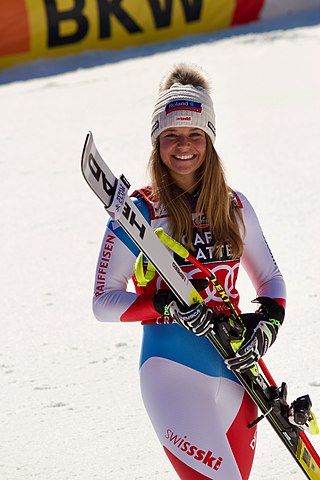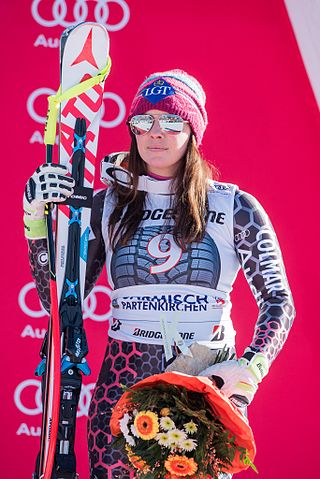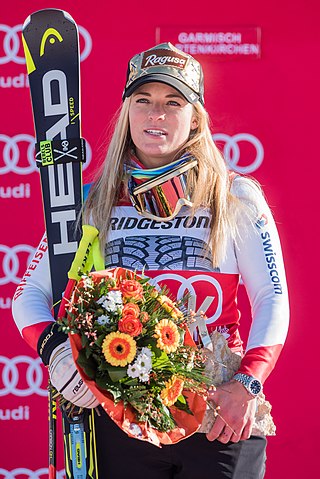
The 48th World Cup season began on 26 October 2013, in Sölden, Austria, and concluded on 16 March 2014 at the World Cup finals in Lenzerheide, Switzerland. The defending overall champions from the 2013 season were Marcel Hirscher of Austria and Tina Maze of Slovenia. The overall titles were won by Hirscher and Anna Fenninger, also of Austria. The season was interrupted by the 2014 Winter Olympics that took place from 7 to 23 February in Sochi, Russia, with the alpine events at Rosa Khutor.

The 49th World Cup season began on 25 October 2014, in Sölden, Austria, and concluded on 22 March 2015 at the World Cup finals in Meribel, France. The defending overall champions from the 2014 season - Marcel Hirscher and Anna Fenninger, both of Austria, defended their titles successfully. The season was interrupted by the World Championships in February, in the United States at Vail/Beaver Creek, Colorado. Combined events were not awarded as a discipline trophy.

The International Ski Federation (FIS) Alpine Ski World Cup was the premier circuit for alpine skiing competition. The inaugural season launched in January 1967, and the 2017–18 season marked the 52nd consecutive year for the FIS World Cup.

The International Ski Federation (FIS) Alpine Ski World Cup was the premier circuit for alpine skiing competition. The inaugural season launched in January 1967, and the 2018–19 season marks the 53rd consecutive year for the FIS World Cup.

The International Ski Federation (FIS) Alpine Ski World Cup, the premier circuit for alpine skiing competition, began in January 1967, and the 2019–20 season marked the 54th consecutive year for the FIS World Cup. As it had every year since 2006, the season began in Sölden, Austria in October. The season was supposed to end with the World Cup finals in March, which were to be held in Cortina d'Ampezzo, Italy for the first time since they began in 1993, but the finals were cancelled due to the COVID-19 outbreak in Italy.

The International Ski Federation (FIS) Alpine Ski World Cup was the premier circuit for alpine skiing competition. The inaugural season launched in January 1967, and the 2020–21 season marked the 55th consecutive year for the FIS World Cup. As it had every year since 2006, the season began in Sölden, Austria in October, and it ended with the World Cup finals in March, which were held in Lenzerheide, Switzerland. However, the COVID-19 pandemic forced many changes to the original racing schedule. Among them were the following:

The men's downhill in the 2021 FIS Alpine Skiing World Cup consisted of seven events. The original schedule had contained nine downhills, but a rescheduled one on 5 March in Saalbach-Hinterglemm, Austria, was canceled due to fog and continual snowfall after just nine skiers had finished, and the downhill during World Cup finals week was also canceled.

The men's super-G in the 2021 FIS Alpine Skiing World Cup consisted of six events, although seven had been originally scheduled.

The men's downhill in the 2020 FIS Alpine Skiing World Cup consisted of nine events, with only one cancellation from the scheduled ten.

The women's super-G in the 2020 FIS Alpine Skiing World Cup involved 6 events, which produced six different winners from five different countries.

The women's downhill in the 2020 FIS Alpine Skiing World Cup involved 8 events, with only one canceled.

The International Ski Federation (FIS) Alpine Ski World Cup was the premier circuit for alpine skiing competition. The inaugural season launched in January 1967, and the 2021–22 season marked the 56th consecutive year for the FIS World Cup.

The women's super-G in the 2022 FIS Alpine Skiing World Cup consisted of nine events including the final. Although no Italian woman had ever won the super-G championship, the battle in 2021-22 was between three of them: speed specialists Sofia Goggia and Elena Curtoni plus 2020 overall champion Federica Brignone. Through the first six races, Curtoni had won one, and each of the others had won two. However, Goggia was injured in a crash in the sixth race, in Cortina d'Ampezzo, and missed the next set of speed races as well as the super-G in the 2022 Winter Olympics. The seventh race, which was held days before the Winter Olympics, was skipped by many of the other top competitors, but was won by Brignone, enabling her to open a sizable lead in the discipline, and Brignone was able to clinch the season championship in the next Super-G when neither Curtoni nor Goggia scored points.

The women's super-G in the 2019 FIS Alpine Skiing World Cup involved 6 events, including the finals in Soldeu, Andorra. Originally, the season had been planned to hold 8 events, but the two races scheduled in Sochi, Russia were cancelled due to continuing heavy snowfall.

The men's downhill in the 2018 FIS Alpine Skiing World Cup involved nine events, including the season finale in Åre, Sweden. Swiss skier Beat Feuz ended the two-season reign of Italy's Peter Fill and won the season title in this discipline after a season-long battle with former discipline champion Aksel Lund Svindal of Norway.

The women's super-G in the 2017 FIS Alpine Skiing World Cup involved seven events, including the season final in Aspen, Colorado (USA). Defending discipline champion Lara Gut from Switzerland got off to a great start by winning the first three races, but she suffered a season-ending injury in early February, which led to a tight battle between the two top contenders remaining: Slovenia's Ilka Štuhec and Liechtenstein's Tina Weirather. With just the season finals in Aspen remaining, Štuhec, who had won two races in the discipline and won the season title in the downhill the day before the race, held a 15-point lead over Weirather, but Weirather nipped Štuhec by 0.35 seconds in the finals, giving her the season title by 5 points.

The men's downhill in the 2017 FIS Alpine Skiing World Cup involved eight events, including the season finale in Aspen, Colorado (USA). Due to difficult weather conditions, only two downhills were held during the first twenty events of the 2016-17 World Cup season, meaning that six were held during the final sixteen events. Defending discipline champion Peter Fill of Italy, who did not win a downhill all season, went into the finals trailing Norway's Kjetil Jansrud by 33 points, but he finished second in the finals while Jansrud finished 11th, thus permitting Fill to repeat as downhill season champion by 23 points despite not recording a win.

The women's super-G competition in the 2016 FIS Alpine Skiing World Cup involved sight events, including the season final in St. Moritz, Switzerland.

The women's super-G in the 2023 FIS Alpine Skiing World Cup is scheduled to include ten events, including the final. Currently, as discussed below, one super-G on 10 December in St. Moritz had been canceled, but it was rescheduled as a second super-G in Zauchensee on 12 January. As discussed in the season summary below, another cancellations took place at the start of February, reducing the season to ten races.

The men's super-G in the 2024 Alpine Skiing World Cup is scheduled to consist of seven events, including the final. The first event of the season was not scheduled until 3 December 2023 in Beaver Creek, and six of the eight races are scheduled to be complete by the end of January 2024. However, as described below, the first race in Beaver Creek was canceled and not rescheduled.














